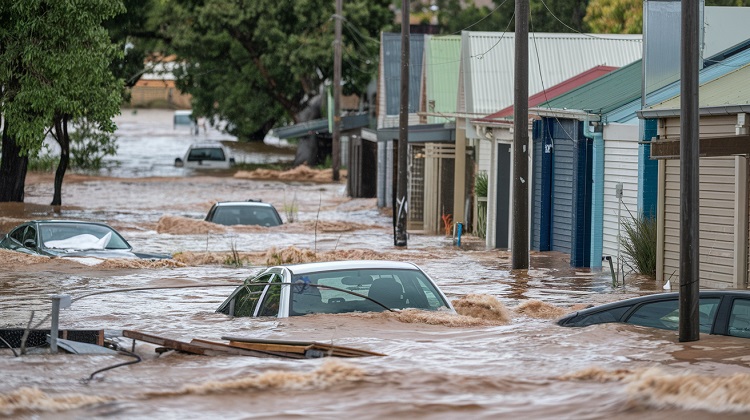Shoppers could soon be paying more for some fruit and vegetables and even experiencing shortages after hundreds of crops in Queensland were wiped out by flooding from Cyclone Jasper.
Floods Devastate Queensland Crops, Threatening Mango Supplies
The recent floods in Queensland have had a catastrophic impact on the region’s crops, leaving farmers in a state of uncertainty. The aftermath of ex-Tropical Cyclone Jasper has resulted in significant damage to farms, leading to potential supply shortages and price increases for a range of produce.
One particularly vulnerable crop is the mango, a beloved fruit that may become scarce in the coming months. However, it is not just the crops themselves that are at risk. The damaged transport routes have caused delays in deliveries, making it even harder for products from North Queensland to reach other parts of the country.
As the cost of fruit and vegetables may rise, the question arises: what are the long-term impacts of this devastating event? The rebuilding process is uncertain, and it remains to be seen how this will affect costs in various sectors. In the face of these challenges, farmers are appealing for understanding and support from consumers, emphasizing the importance of buying local produce and helping to revive the economy.
Key Takeaways
- Flooding from ex-Tropical Cyclone Jasper has caused widespread damage to crops in Far North Queensland.
- Mangoes, along with other crops like papayas, limes, and pineapples, are likely to be in shorter supply due to the flooding.
- There may be potential supply shortages or price increases for some products, and it may be harder to find North Queensland produce in other parts of Australia.
- Efforts are being made to support farmers, with local fruit sellers helping growers get their products to market, and the federal and state governments working to fix supply routes.
Impact of Flooding on Queensland Crops
Flooding from ex-Tropical Cyclone Jasper has had a devastating impact on crops in Far North Queensland, affecting every farm in the region in some way. The flooding has not only destroyed crops but also caused damage to transport routes, leading to delays in deliveries.
As a result, there are warnings of potential supply shortages and price increases for certain products such as mangoes, papayas, limes, and pineapples. It is anticipated that some products from North Queensland may be harder to find in other parts of Australia.
Furthermore, the rebuild process may lead to increased costs in construction materials and insurance premiums. These factors will be considered by the Reserve Bank when deciding on interest rates, which economists believe may slow down rate cuts but are unlikely to result in a rate rise.
Efforts are underway to support farmers, with local fruit sellers and the government working to fix supply routes. Farmers are appealing for understanding and support from shoppers, and Australians are encouraged to buy special produce to support the affected farmers.
The long-term impacts of the flooding on the cost of fruit and vegetables and various sectors are still uncertain, but it is essential to continue supporting the farmers of North Queensland for the sake of the local economy.
Potential Supply Shortages and Price Increases
The recent flooding in Far North Queensland has raised concerns about potential supply shortages and price increases for certain products. Mangoes, papayas, limes, and pineapples are likely to be in shorter supply due to the devastating impact on crops caused by the flooding. As every farm in the region has been affected in some way, there are warnings of potential supply shortages or price increases for these products.
Moreover, the damages to transport routes have caused delays in deliveries, which may further exacerbate the supply shortage issue. As a result, some products from North Queensland may be harder to find in other parts of Australia, and the cost of fruit and vegetables may rise over the next few months.
Another consideration is that the rebuild process may lead to increased costs in construction materials and insurance premiums, which could have an impact on prices. These factors will be taken into consideration by the Reserve Bank board when deciding on interest rates, as it may potentially slow down rate cuts.
Efforts to Support Farmers
Local fruit sellers and government entities have joined forces to provide support and assistance to farmers affected by the recent flooding in Far North Queensland. Peter Ram, a local fruit seller, is helping growers get their products to market, ensuring that their hard work doesn’t go to waste.
In addition to individual efforts, the federal and state governments are working with the transport and food sectors to fix supply routes that have been damaged by the floods. The Queensland Farmers Federation is also playing a crucial role in representing the affected farmers and advocating for support. Producers are pleading for understanding and support from shoppers, urging Australians to buy special produce and support the farmers in this difficult time.
Call for Understanding and Support
As farmers in Far North Queensland face increased costs and challenges in the aftermath of the floods, their plea for understanding and support from shoppers becomes imperative. The devastating floods have not only destroyed crops but have also damaged transport routes, causing delays in deliveries. This has led to potential supply shortages and price increases for products such as mangoes, papayas, limes, and pineapples.
In light of this, Australians are encouraged to continue buying special produce despite potential price increases, as supporting farmers of North Queensland is vital for the local economy. The Queensland Farmers Federation is advocating for support on behalf of the affected farmers, and local fruit sellers, like Peter Ram, are also helping growers get their products to market.
Flooding’s Destruction of Crops
The devastating floods in Far North Queensland have caused widespread destruction of crops. Every farm in the region has been impacted in some way, with flooding from ex-Tropical Cyclone Jasper wreaking havoc on agricultural land.
The damage to transport routes has also resulted in delays in delivering crops to market. As a result, mangoes, papayas, limes, and pineapples are expected to be in shorter supply, and there are warnings of potential supply shortages or price increases for these products.
The cost of fruit and vegetables may rise over the next few months, as the rebuild process may lead to increased costs in construction materials and insurance premiums. Efforts are being made by local fruit sellers, governments, and the Queensland Farmers Federation to support affected farmers and ensure the availability of produce in the market.
Delays in Deliveries Due to Damaged Transport Routes
Due to the damage caused to transport routes, deliveries are experiencing significant delays in the aftermath of the floods in Far North Queensland. The flooding from ex-Tropical Cyclone Jasper has not only destroyed crops in the region but has also wreaked havoc on the infrastructure necessary for transporting goods.
With every farm in the area impacted in some way, the damage to transport routes has made it challenging for suppliers to deliver their products on time. This disruption in the supply chain is particularly concerning for the mango industry, as it threatens the availability of mangoes not only in Queensland but also in other parts of Australia.
Efforts are underway to repair and restore the damaged routes, but it may take some time before deliveries can resume their normal schedule.
Specific Crops at Risk of Shortage
Mangoes, papayas, limes, and pineapples are among the specific crops that are at risk of shortage due to the recent flooding in Far North Queensland. The flooding, caused by ex-Tropical Cyclone Jasper, has devastated crops in the region, impacting every farm in some way.
With transport routes damaged, there have been delays in deliveries, further exacerbating the potential supply shortages. As a result, there are warnings of potential price increases and scarcity for these crops. Consumers may find it harder to locate these products, particularly in other parts of Australia.
Additionally, the cost of fruit and vegetables may rise over the next few months due to the rebuilding process, which may lead to increased costs in construction materials and insurance premiums.
Rebuilding Process Increases Costs
The process of rebuilding in the aftermath of the flooding is leading to increased costs in various sectors. As farms and infrastructure are being restored, the costs of construction materials and labor are rising.
Additionally, insurance premiums for both farmers and businesses are expected to increase due to the heightened risk of future flooding events. These increased costs are likely to have a knock-on effect on the prices of goods and services, including fruits and vegetables. As a result, consumers may experience higher prices at the grocery store in the coming months.
The rebuilding process is not only a financial burden for farmers but also for the broader economy, as it may slow down rate cuts by the Reserve Bank. It is crucial for all stakeholders to come together and support the affected communities during this challenging period.
Economic Implications and Reserve Bank’s Response
The financial ramifications of the recent flooding in Queensland are significant considerations. The destruction of crops and damage to transport routes will likely lead to supply shortages and price increases for products such as mangoes, papayas, limes, and pineapples. This could result in higher costs for fruit and vegetables in the coming months.
The rebuild process itself may also lead to increased costs in construction materials and insurance premiums. These economic implications will be taken into account by the Reserve Bank when deciding on interest rates. While economists believe it is unlikely to lead to a rate rise, it may slow down the rate at which rates are being cut.
Efforts are being made to support farmers and encourage understanding and support from shoppers. The Queensland Farmers Federation is advocating for assistance and urging shoppers to continue buying special produce despite potential price increases.
Conclusion
In conclusion, the recent flooding in Far North Queensland has had a devastating impact on crops, particularly mangoes, papayas, limes, and pineapples. This has led to potential supply shortages and price increases for these produce items.
Efforts are being made to support the affected farmers and restore supply routes, but the long-term impacts and rebuilding process remain uncertain. It is important for shoppers to understand and support the local economy by continuing to buy special produce during this challenging time.
Albion News is a great place to find informative, up-to-date news articles. We provide a wide range of unique articles that offer an interesting perspective on current events from around the world and from various different sources. You can easily search for the topics that matter most to you and explore in-depth pieces that provide insight into the issues and important debates occurring today. Albion News helps you stay informed with carefully researched and credible stories!







